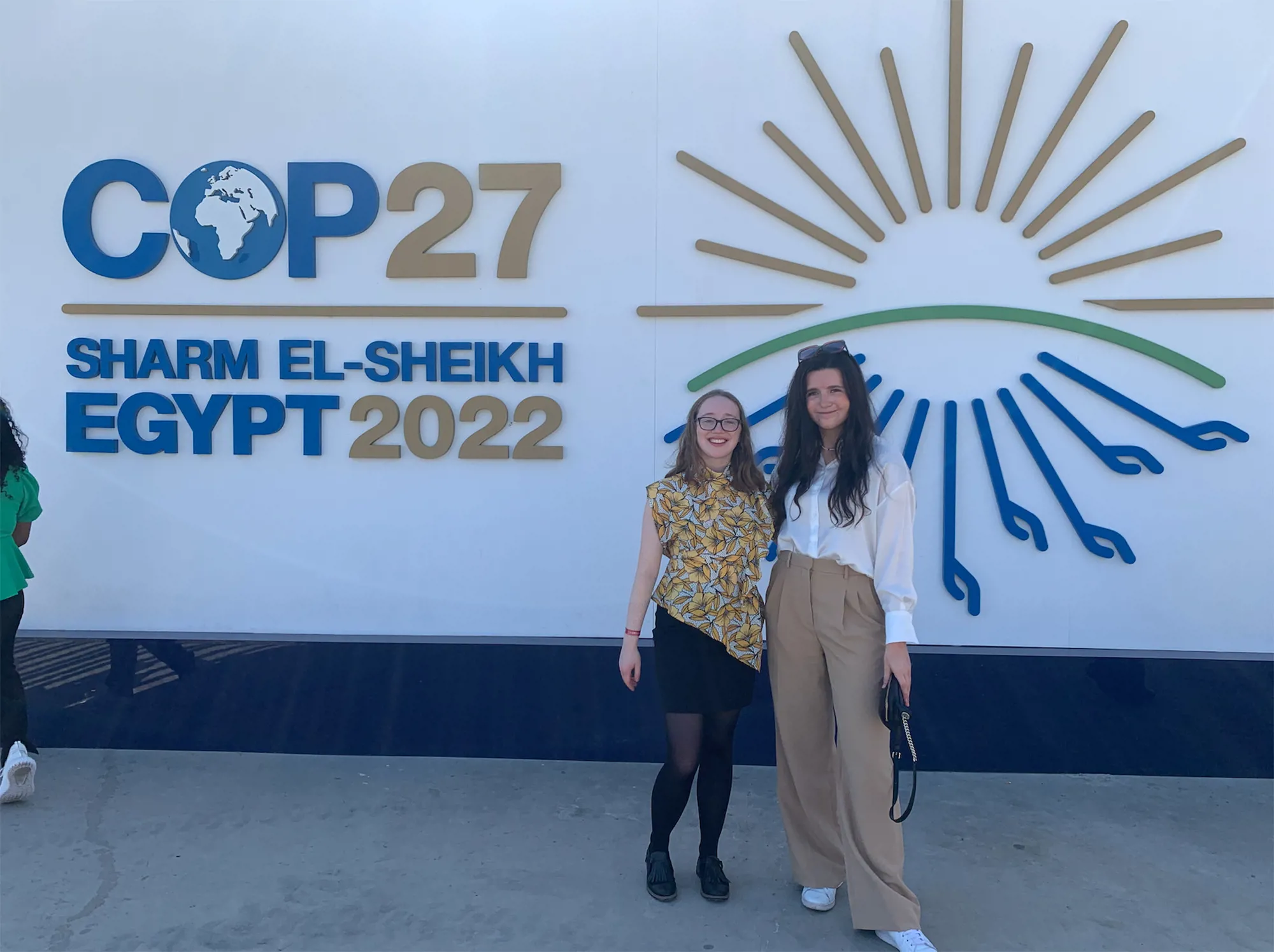The Conference of Parties (COP), is an annual meeting organised by the UNFCCC (United Nations Framework Convention on Climate Change) to assess the progress of implementing climate policy.
This year’s themes included loss and damage, climate finance and adaptation, with emphasis on the destruction of indigenous and developing ecosystems, and the associated injustices observed.
With the generous backing of the IET, we were able to attend this year’s conference in Sharm El-Sheikh.

It was a privilege to converse with some of our heroes about the biggest challenge faced in our lifetimes and learn of new technologies from experts in the field, further contributing to our professional development.
Upon collecting our passes on Monday we were greeted with the eclectic buzz of the conference centre.
The sheer volume of stands, events, people (around 30,000) was overwhelming but incredibly exciting.
Over the next two days, we conversed on climate with the likes of Mary Robinson and Ed Milliband, attended workshops at the first ever ‘Children and Youth Pavilion’, attended a negotiation that was adapting specific clauses from the Glasgow Climate Pact and spoke in interviews for Deutsche Welle and Action for Climate Education.
As young engineers, we were very excited to hear from youth voices and contribute to discussion on how the next generation can influence climate change policy.
On Tuesday, we attended a Youth Bilateral with COP26 President Alok Sharma, where we discussed thoughts on ongoing negotiations and the Global Youth Statement (from the Conference of Youth held in the week prior to COP).
We found the discussion on progress since COP26 particularly interesting and admired the fact he shared the same determination to hold on to the 1.5°C promise.
We were also invited to a drinks reception at the Dutch Embassy House in Sharm El Sheikh, hosted by Rob Jetten (Minister for Climate and Energy Policy in the Netherlands). In this intimate setting, we had the chance to engage with foreign ministers across Europe as well as hear from youth who had experienced the effect of climate change firsthand.
This year's COP focused on loss and damage, and some of the most powerful talks came from those who had witnessed the effects of global warming and deforestation on their communities.
In a plenary session, we heard from Helena Gualinga from the indigenous Kichwa Sarayaku community: an Ecuadorian village made up of only 1,500 people. Helena had witnessed the devastating effects of deforestation and recalled when 1.5 tonnes of explosive was used to clear the forest for oil exploration.
The conference gave us a rare opportunity to hear and meet people like Helena and understand the urgency around climate action.
Both of us have a keen interest in new climate technologies so we also spent time attending presentations and meetings based on topics such as carbon capture, hydrogen technologies and greener grid initiatives.
We attended a very interesting NASA hyper-wall presentation about tracking the biomass and sequestrations of trees using LiDAR technology.
It was great to see engineering solutions being applied to help with our understanding of climate change, and how we can further implement them to help us achieve net zero.
Overall, our week at COP27 was inspiring, informative, and emotional.
It was a privilege to attend with backing from the IET: it has inspired us to speak out about Youth Voice and help make a difference to climate change policy.
There is still so much to be done to keep 1.5 °C alive, so we look forward to further applying our engineering skills to ensure a just energy transition.
We’re upgrading our systems, and this includes changes to our customer and member account log in, MyIET. It’s part of our big picture plan to deliver a great experience for you and our wider engineering community.
Whilst most of our websites remain available for browsing, it will not be possible to log in to purchase products or access services from Thursday, 17 April to Wednesday, 30 April 2025. Our Member Relations team is here to help and for many of our services, including processing payments or orders, we’ll be able to support you over the phone on +44 (0)1438 765678 or email via membership@theiet.org.
We apologise for any inconvenience this may cause and thank you for your understanding.
For further information related to specific products and services, please visit our FAQs webpage.
